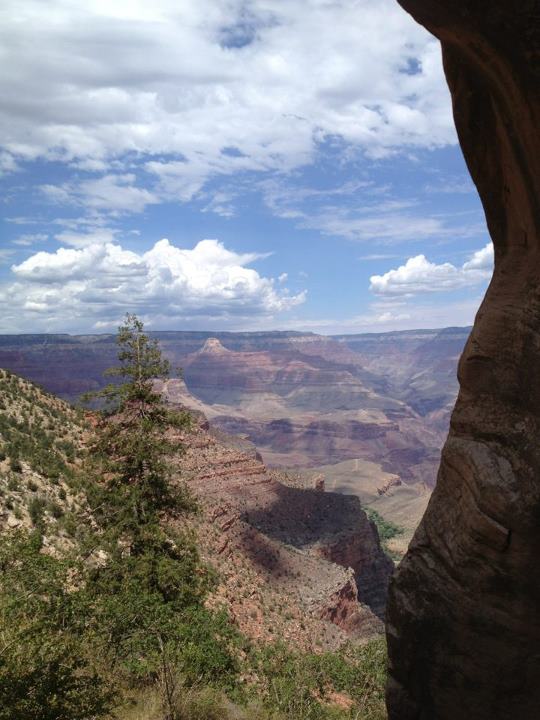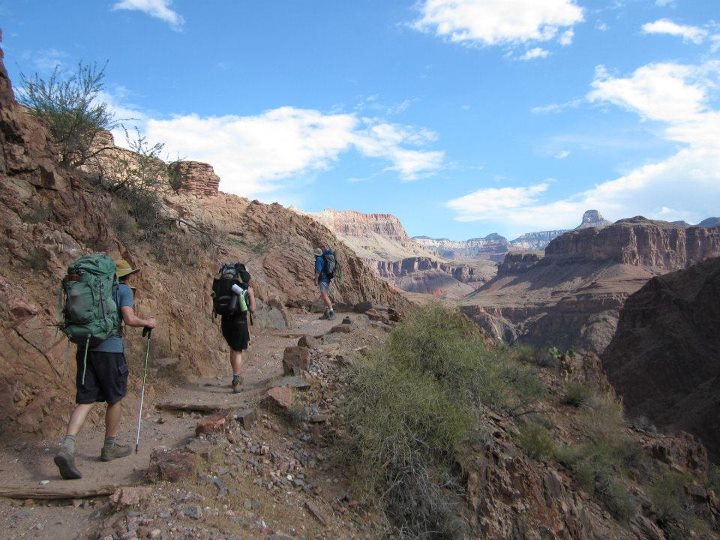Hiking out of the Grand Canyon — 8 miles, 5,000 feet — felt like re-emerging from a quiet haven inside the earth to stand again atop the soil of civilization. Back up here it's a hot and crowded mess. Everything feels excessive. Everyone seems oblivious. The chaos is distinct after having been so deeply peaceful and disconnected. It feels like I’ve been gone for months, yet it's only been seven days.
We saw so much in those 90 miles rafting downstream.
Now at the end of the trail, wet from rain, sweaty from the hike, proud of my own strength for having made it to the top, relieved to remove my pack, I stand elbow to elbow in a swarm of tourists. Kids fight over a cell phone, an old lady lights a cigarette right next to me. I feel as if I can see all this for what it is. And it hurts, somehow.
I want to shake the old lady and shout at her, say, do you know what we saw down there?! — the mighty power of the river, the smooth curves of slot canyons, the bursting volcanic rock layers, the upward push of a vertical fault, giant boulders tossed aside like a wizard's board game, mountain deer grazing, so many shooting stars! What a wonder our Earth is, insides spilling out into the canyon.
She ashes her cigarette. I move aside to breathe fresh air.
I understand the stress-induced blur caused by the pattern of regular life, the agitation and distraction. It's almost a social norm. Or perhaps it's an addiction. I see it with both disgust and understanding — that nagging habit, the idea that we’re readily available at all hours, a symptom of that demanding professional job I no longer have. Here now, just off the river, I think about this and how I’m old enough to know a time before the savior and distraction of internet and cell phone. Now, it seems we can’t focus on what’s right in front of us, technology aside.
“This is a day when life and the world seem to be standing still––only time and the river flowing past the mesas.”
Most people who visit the Grand Canyon will only see it from the rim. I feel gratitude and honor to have been one of 20,000 people a year who get to feel the canyon from eye level. Down where, as a human, the power of the river tends to make you feel insignificant, reminding you you're mortal.
Departing from Lee's Ferry, just south of Glen Canyon Dam where the great Colorado river starts, our team of 17 sets off in oar boats and rafts. Within the first few rapids I am completely doused, covered in freezing 46 degree dam-released water. Let me tell you something I don't like about myself: I hate cold water. It chills me to the bone and hurts. I close my eyes, shivering, silently wondering how I will make it through seven more days.
Everything down here in the Grand Canyon is contrast and extreme. While the water temperature is shockingly cold, the arid desert air reaches scorching highs. July is monsoon season, meaning that thunderstorms can roll in on the turn of a dime. Peering up from within the canyon walls, our guides gauge which slot canyons are safe to climb based on a segment of visible sky. If it rains, slot canyons can flash flood which would put us all in grave danger.
When you live off the grid like this, days are altered by the whims of the sky and waters. Everything feels different. The stakes are higher. You are reminded that you are not the one controlling the world, and with that you feel more physically vulnerable. It brings back a forgotten respect for this land, this place, the Earth.
Time is lost here. There is no scheduling, planning, texting. No, here it’s just survival, exploration, wonder. Every moment dictated by the winds, waters, rain, sun. On the rafts, we are so very exposed. I think about what it must have been to live this way, subservient to nature. I understand why Native American tradition is built upon honoring and respecting land in a way our culture somehow managed to miss.
Hiking up to Native American granaries
One scorching day, we hike up out of the canyon to peer into the remains of a Native American granary tucked precariously high into the side of a rock wall. I imagine what lengths they went to just to preserve seeds, to survive. I make the hike, which is more of a climb, with water bottle, sunscreen, electrolytes, granola bars. I will go back to camp and eat a meal prepared by our guides with barely a thought of where the food came from.
***
Our days on the river start at sunrise with the sound of a conch shell and cowboy coffee. It quickly becomes routine, the labor of packing up, shipping out, and then the reverse each night.
At first I think we'll never feel rested after such long, physical days. I think this because "natural disasters" seem to happen every night. While camping beneath an overhanging rock, peeking out at the stars and lightning in the distance, the wind begins to pick up. Sand blows everywhere, blinding us, feeding us dirt. We've not set up a tent figuring the overhang would protect us from any rain. We had not thought about sand. Now a relentless spray prevents us from re-adjusting for shelter, let alone sleep. I lay immobile wrapped in a tarp, wondering if this will last the whole night.
It doesn't, but I don't get much sleep. The next night there is a flood for those who set up tents on a small peninsula. I awake to flashing lights and the sound of rushing water. With my headlamp, I see my campmates scrambling to collect their wet possessions before the current sweeps anything away. There is now a gapping divide of water between my camp and the rest of my companions. It is abnormal that the water level has risen this high this fast in the middle of the night; releases from the dam are regular and scheduled. Groggily, I lay back to sleep, swapping positions so my feet are now towards the river should the water continue to rise.
By the third night, I barely sleep. It's sweltering hot. We've zipped ourselves inside our tent because mysterious bugs have been biting at this campsite. I'm too exhausted to even care anymore, and by the fourth night I pass out upon spreading my mat onto the sand, the now familiar lull of the river humming me to sleep at last.
***
All along the way the undulating motion of the river is interrupted by rapids of varying degree, usually caused by clusters of giant rock that have washed into the river's path with the passage of time or the power of a flash flood spilling out from a slot canyon. The entire journey is like a slow moving film, hour by hour revealing changes in the rock that occurred billions of years ago. It's a length of time impossible for humans to conceptualize, yet it's always there, right beneath our feet. I feel lucky to experience the history of the Earth this way, so intimately, guts spilling open before me. Floating on the oar boat, there is time enough to study and feel this wonder. My little life, from this perspective, seems so unlikely.
Somehow it’s so easy to live in the present moment here because there isn’t much else besides beauty and survival. The river is King. I’m reminded that in modern society we live with the false belief that we can control what happens to us.
As adults we lose our childhood playfulness somehow, becoming weighed down by judgement, stress, to-do lists, the next big thing. But being on the river this way, nature pure, pulls it back out of me.
I believe this is inside us — the desire to return to the quiet and peace of nature, the freedom to play and really live. I believe it's what many are searching for, but we have forgotten or become trapped in habit. I can't help but wonder, is there a way to find balance, to bring this understanding, respect, peace, this life, back?
***
Hiking out of the Grand Canyon from Phantom Ranch
I am back on top of the Grand Canyon, standing along the rim. Everyone is distracted, they can’t see what’s before them, or they can, but they can’t understand its depth.
I understand what we are all looking for, I just felt it, but know not how to hold onto it. I close my eyes, think back to those great rocky walls rising up, that river relentlessly flowing along, the silence of those summer nights. It’s as if our journey was the Earth itself taking us back inside for a moment, giving us a glimpse of who we are and what it took for us to arrive here, giving us perspective, reminding us what matters.
The river is like life — its beauty, its flow, its obstacles, its unending persistence.
Sunset in the canyon, our last night











